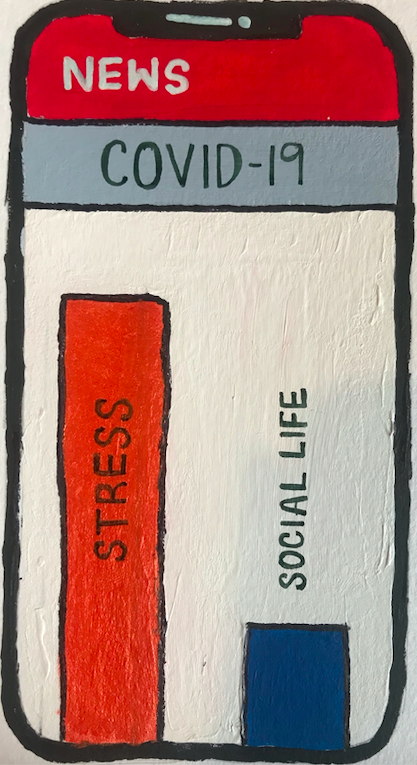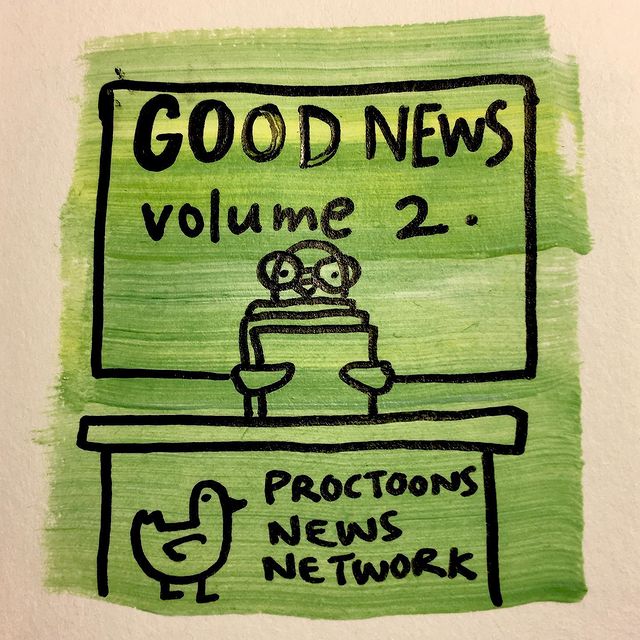By Ellie Spenceley, Second Year, English
The Croft Magazine // With so much happening locally and globally at the moment, it can be easy to get caught in a never-ending scroll, consuming one piece of negative news after the other. While it's good to stay in-the-know, overconsumption of news can be hugely detrimental to our wellbeing.
Content warning: this article contains references to racism and police brutality
Mental health experts have warned that ‘doom scrolling’, the act of consuming a large quantity of negative news online at once, can be incredibly detrimental to our mental health.
In a time such as now, however, when each day seems identical to the last, it has become even easier to develop the habit of consuming a plethora of negative news at every spare waking moment, with there being little else to do but pick up your phone. Wake up, scroll. Go to bed, scroll. Break from Zoom meeting? Scroll.

Why are we psychologically wired to indulge in things we know are bad for us, and how can we shift away from this to create healthier habits during lockdown?
Our hyperconnected world has cultivated a culture of guilt to coincide with how accessible the global state of affairs is: if we can read about it, but choose to ignore it, are we bad people? Should we be constantly engaged to make up for our relative privileges, proving to ourselves and others that we care, that we aren’t choosing to turn a blind eye to global atrocities simply because we can?
In light of COVID-19 and the re-emergence of the Black Lives Matter Movement in the media following the murder of George Floyd, it has been hard to avoid the daily headlines depicting death and trauma, often without any hope for betterment in the near future.
Being unable to see friends in person, we have little choice but to connect with them on the same platforms that are bombarding us with stories of devastation and loss. Consuming the negativity that the media presents seems like the only way to connect with the world beyond our doorstep.
We are now in an age where the media has the ability to infiltrate every single aspect of our lives
Good things are no doubt happening too, but we have been hardwired to focus more energy of things of a negative nature. This actually has a name – the ‘negativity bias’, and is the notion that, even when of equal intensity, things of a negative nature have a greater effect on one’s psychological state and processes than neutral or positive things, even when each is of equal importance.
‘Doom scrolling’ is not necessarily a new phenomenon. A hypothesised cognitive bias in the 1970s – ‘mean world syndrome’ – was coined to assert the idea that people may perceive the world to be more dangerous than it actually is due to long-term moderate to heavy exposure to violence-related content. Whilst the 20th century had these effects limited to television, radio, and print, we are now in an age where the media has the ability to infiltrate every single aspect of our lives.
This was already an issue pre-pandemic, but now, in the midst of a global health crisis, where our perception of the outside world is predominantly limited to our screens, it is painstakingly hard to disconnect for the sake of our wellbeing. If others are suffering so extremely, we begin to question if we can allow ourselves to simply log off and put the kettle on to protect our peace of mind.
So how can we healthily stay informed whilst combatting the negative effects of news overload?
Putting boundaries and limits in place can be a good start. Going cold turkey is likely to backfire – and isn’t compatible with staying aware of what is going on – but the benefits of exercising restraint are abundant. Phones usually let you set limits on how much time you can spend on them, or on specific apps, or you could just monitor this yourself.
Perhaps limit yourself to 30 minutes of news consumption a day. Move your phone outside your bedroom so you don’t wake up and wind down to the perpetual scroll.
Practice self-compassion. Remind yourself that you’re human. These are unprecedented times, and to just be getting through the day is something you should be considering a feat. The combination of mental overexertion and the lack of physical stimulation can be exhausting.
Treat yourself like you would a child: check in with your basic needs and recognise how excessive news consumption is making your body feel. Mental health has a direct impact on physical health: do you feel like you constantly have low energy levels? Are you always tired? Do you find it hard to get to sleep, or sleep too much?
Finding hope in a new year after one like the last
The power of a routine in uncertain times
Prioritise your fundamental wellbeing and realise that exposing yourself to too much negative news at once is not beneficial. Take a rest, a social media break perhaps. ‘Self-care’ has become a buzzword that often receives an eye-roll in response, but its importance cannot be understated. So take that bubble bath and put the screens to one side.
Scrolling is not an inherently bad thing. It allows us to connect, to educate and express ourselves, and to share passions. The problem arises when we stop being conscious about what we consume and when we are not actively limiting the potential negative effects. Consider taking a step back and putting yourself first, even for a moment.
Featured image: Epigram / Alice Proctor









